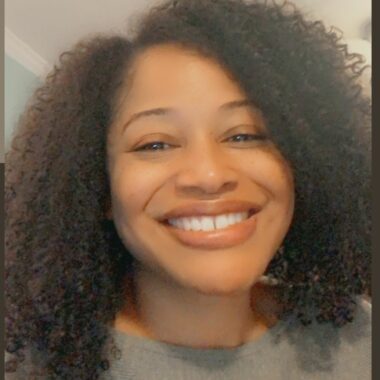
Teresa E. Harris
Teresa writes pitch-perfect, evocative middle grade and picture books full of irresistible characters.
Teresa E. Harris (she/her) earned her bachelor’s degree in English from Columbia University and an MFA in Writing for Children from Vermont College, where she won numerous awards, including the Flying Pig Grade-A, Number-One Ham Humor Award. She is the author of the picture book Summer Jackson: Grown Up, several American Girl books, and the middle grade novel The Perfect Place, which was selected as one of Bank Street’s Best Children’s Books of the Year in 2015 and about which Jacqueline Woodson said, “What an amazing debut! I loved it.”
Teresa once worked in children’s publishing, but took a publishing hiatus to focus on her work as a high school English teacher in New Jersey. She now spends most of her time grading papers, hanging out with her two cats Baxter and Nox, and building new–and familiar–worlds with her words.
Teresa is represented by Chelsea Eberly.
Author Interview
When and how did you start writing?
I first started writing a lot in middle school, though sadly none of it was very good. In fact, what I was writing was a mish-mash of what I was reading at the time. So, imagine the Baby-Sitter’s Club members attending Sweet Valley High with the Sleepover Friends.
Can you remember the first book that made an impact on you? Who were your childhood storytelling heroes?
We read BRIDGE TO TERABITHIA and ROLL OF THUNDER, HEAR MY CRY in elementary school. These books, aside from being beautifully written, were the first books that I can remember evoking an emotional response in me. Reading them marked the first time I connected to fictional characters in such a way that their pain became mine. These were the first books that made me cry, and I remember marveling at the power books could have, a power I hadn’t known existed before.
For this reason, Katherine Paterson and Mildred Taylor were — and still are — my childhood storytelling heroes. I also loved Judy Blume and R.L. Stine. No one could make me laugh like Peter and Fudge, and only Stine could make me sleep with the lights on.
Can you talk us through the writing of your first book? What were the key moments?
I began writing my first middle-grade novel while a student at Vermont College of Fine Arts. I started it so many times. So, so many times, but I never got tired of it, because I loved my characters and I really wanted to tell their story the best way I could. By the time I finished Vermont College, I’d written 110 pages. Then, I was on my own. I had to develop my own writing schedule, with no college advisor to hold me accountable. That was scary, but I took it one day at a time, two pages a day, until at last I finished. Selling that novel a few months later was the best day of my life.
Describe your writing day. Where do you write? How do you organize your time? Where do you look for inspiration?
Organization has never been my strong point, so I just tell myself that I am going to write every day. Sometimes I start writing in the afternoon; sometimes I don’t do so until midnight. As long as I write, that’s all that matters.
Sometimes, if I’m feeling stuck, I’ll pluck a book off of my shelf for inspiration. If I’m having trouble with humor, I may reach for those good old Fudge books. For trouble with description, I may reach for a book by Katherine Paterson or Nancy Farmer, because they both do it so well. Of course, after reading their work, I’m immediately humbled, but also inspired enough to go and try to create my own great scenes.
Are there any tips you could give aspiring writers who are looking to get published?
Focus on your writing, not the sale. Always work on improving your writing as much as possible and the sale will come. Also, don’t beat yourself up if you miss a day of writing, or write something that you hate. We’re not surgeons; no one dies if we slip up.
Can you describe three aspects of writing craft that have been most important as you’ve developed as an author?
Finding my middle-grade voice was a huge triumph for me. Working with my editor has taught me a lot about tightening plot. It’s tempting to use everything in a novel — every plot line you’ve ever thought of since you started writing in middle school — but you can’t. You really can’t. There will be other books. Go ahead and save some plot for them. And, lastly, it sounds so Writing 101, but I’ve learned it’s really important to keep asking yourself, ‘What does my character want?’ Forgetting for a moment can leave you completely lost within your own novel, and novel no man’s land is not a fun place to be.
Which favorite authors would you invite to a dinner party? What fictional character do you wish you’d invented?
I would invite Rita Williams-Garcia and Jacqueline Woodson because I think they’re brilliant; Neal Shusterman because he’s hilarious; and Nancy Farmer because she’s so creative. I just want to pick her brain over free-range chicken and a side of mashed potatoes.
I wish I’d invented Gilly Hopkins (created by Katherine Paterson). That little girl is tops in my book.
